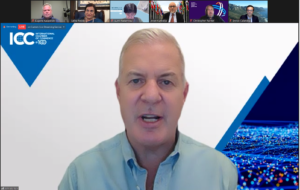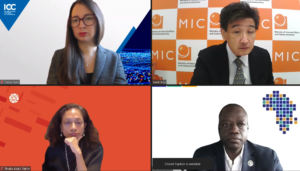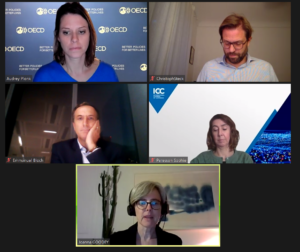
ICC advocates for sustainable, secure, and inclusive digital policies for all at IGF 2020
The International Chamber of Commerce (ICC) virtually joined stakeholders at the annual Internet Governance Forum (IGF) to share in policy conversations concerning the future of Internet governance.
During the first-ever virtual IGF, ICC convened business, government, civil society and the technical community to discuss the most pressing issues related to Internet governance through a series of workshops, high-level sessions, and roundtable discussions. Taking place under the theme of “Internet for human resilience and solidarity,” this year’s IGF developed around four thematic tracks: data, environment, inclusion, and trust.
Here is how ICC contributed to this year’s Forum:
Reinforcing ICC’s call to make technology work for all
In the context of the COVID-19 pandemic, ICC Secretary General John W.H. Denton AO published a LinkedIn article calling upon ICC members and representatives to redouble their efforts to make technology work for all. Launched on the side-lines of last year’s IGF in Berlin, ICC’s make technology work for all campaign advocates for sustainable, secure, and inclusive digital policies and a continued multistakholder approach to Internet governance.
Reflecting on digital access in the age of the COVID-19 pandemic, Mr Denton wrote, “Many of us have benefitted greatly in this challenging year from high levels of digital access to keep our connections with family, friends and work active. But the COVID-19 crisis has made it very clear that too many have been left behind for too long as technological integration in business and society has rapidly advanced.”
As the world recovers from the human and economic consequences associated with the pandemic, Mr Denton writes that stakeholders must work together to close the digital gap. “It’s incumbent upon business, government, and civil society to work cooperatively to design and implement the enabling environments for digital access that will end these digital differences and make technology truly work for all.” Read Mr Denton’s LinkedIn post now.

Improving Internet trust and security in times of crisis
Due to the COVID-19 pandemic, there has been an exponential surge in the use of digital technologies and the Internet, which has also exposed vulnerabilities of people and businesses, many of them coming online for the first time or using less secure home networks to conduct business.
Taking the COVID-19 pandemic into account, the IGF 2020 trust track discussed strategies for protecting all aspects of the digital ecosystem. As part of the High Level Leaders Track on Security implications of the role of Internet governance in the age of uncertainty, Mr Denton spoke about the digital and cyber security challenges faced by small and medium sized enterprises (SMEs). Mr Denton underscored the importance of providing SMEs with a resilient, secure, and healthy digital environment.
“One of the challenges is that SMEs and MSMEs don’t always operate as independent entities – they are integral parts of the global supply chain. What’s happening is that the weakest link, arguably in the global supply chain, is being attacked,” said Mr Denton.
Mr Denton emphasized the need for continued support of MSMEs in their digital transformation through enhanced capacity building, such as cybersecurity training to raise their trust and confidence in bringing their operations online.
As the primary source for business input at the IGF process, ICC advocates for policy frameworks that promote robust and appropriate data protection that guarantees user privacy, while also supporting an efficient and innovative global marketplace. During a panel on Promoting Trust on the Internet through the Osaka Track, Timea Suto, Knowledge Manager, ICC Innovation for All, outlined ICC’s support for data free flows with trust, stating, “Our future is unquestionably digital and data is at its core…[we] must ensure that enabling policy systems are globally interoperable to help companies navigate today’s extremely complex and fragmented regulatory environment.”

Cross-border data flows and toward artificial intelligence guidelines
ICC Business Action to Support the Information Society (BASIS) hosted a workshop on lessons learnt from data sharing initiatives during the pandemic. Moderated by Mila Romanoff, Privacy Specialist, Data Policy and Governance Lead, UN Global Pulse, the session considered how the current crisis has accelerated the need for coherent international frameworks for responsible data sharing and how all stakeholders can best cooperate to put data to work for the benefit of all. . Panelists from Microsoft, Telefonica, the Federal Government of Germany and the World Wide Web Foundation discussed how responsible data-sharing arrangements between private and public organisations can advance research, new products and services, and policy development.
ICC BASIS also hosted a pre-event on the role of the private sector in the development of ethical artificial intelligence (AI) guidelines. Led by Sophie Peresson, Director, ICC Innovation for All, the workshop brought together representatives from multilateral organisations, like the European Union Frundamental Rights Agency, the Council of Europe, UNESCO and the Organisation for Economic Co-operation and Development (OECD), and the private sector to discuss effective AI governance frameworks. Panellists agreed that both private and public organisations need to work together to implement guidelines that harness the benefits and mitigate the risks associated with AI. Speaking on the role and accountability of business Carolyn Nguyen, Director, Technology Policy at Microsoft noted “As the private sector normally takes the lead in technology innovation and brining this innovation to market, we need to consider our responsibilities – just because we can doesn’t mean we should.”
Reflecting on the need for a close cooperation between the private and public sectors to promote the deployment of trustworthy AI, she added “Democratic governments must move forward with new policies and programs – separately, with each-other and in a new form of collaboration with the technology sector…to co-create an ecosystem of trust, foster positive societal impact and find new ways to address the challenges that arise in a timely manner.”

Environment
In her capacity as a member of the IGF Multistakeholder Advisory Group (MAG), Ms Suto organised the IGF Main Session on Environmental issues in the era of digital transformation. Hosted by Mr Krzysztof Szubert, Former Secretary of State and Deputy Minister of Digital Affairs, Poland, with the participation of leading experts from the public and private sector, the session explored how technologies are used and developed throughout the world to measure, understand, and address the impacts of climate change. After serving a full three-year term, Ms Suto will rotate off the MAG for 2021.
Appointment to Multistakeholder Advisory Group (MAG)
UN Secretary General António Guterres appointed 15 new members to serve on the Multistakeholder Advisory Group (MAG) that will work to prepare the 16th Internet Governance Forum (IGF).
Sophie Peresson, Director, ICC Innovation for All was nominated as representative of the private sector along with ICC BASIS members Hazar Alzaki (Microsoft) and Khaled Koubaa (Facebook) and two other private sector candidates from Germany and Poland, joining four previously serving business members of the MAG that have been renewed for another term.
Under the leadership of Chair Anriette Esterhuysen, a total of 40 members make up the MAG, representing all stakeholder groups and regions.
Focus turns to Katowice in 2021
In his closing remarks, UN Secretary General Guterres acknowledged that inclusive and meaningful access to the Internet will be key for a strong COVID-19 recovery. Echoing Mr Denton’s LinkedIn post, Secretary General Guterres said, “the COVID-19 pandemic has shone a spotlight on the importance of digital technologies and transformation, and on the urgent need to enhance the role of the IGF as a platform for dialogue on proposed solutions.”
As the convenor of global business, ICC is looking forward to the next edition of the IGF in Katowice, Poland on 6-10 December 2021 and working alongside all stakeholders in the coming year to bridge digital gaps and accelerate an inclusive COVID-19 recovery for all.
